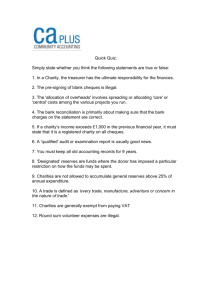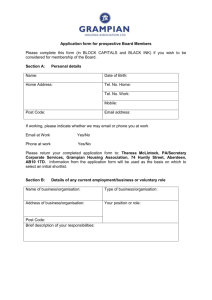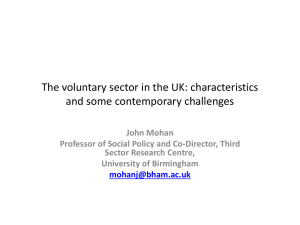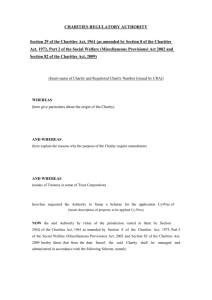Relate August 2014 - Citizens Information Board
advertisement
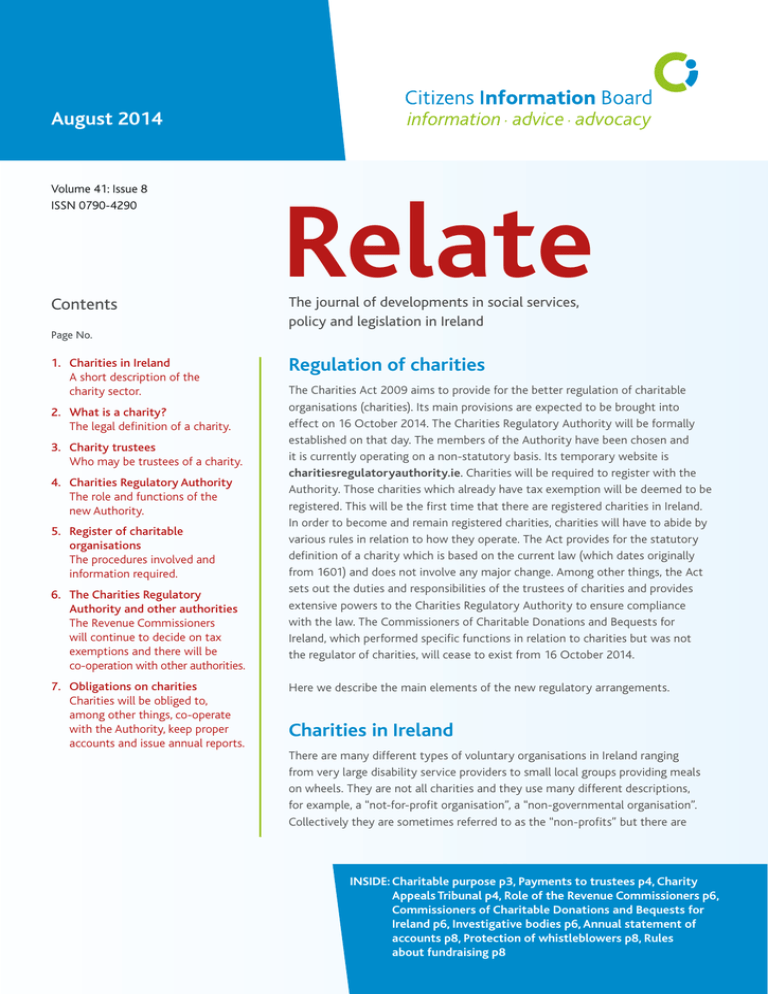
August 2014 Volume 41: Issue 8 ISSN 0790-4290 Contents Relate The journal of developments in social services, policy and legislation in Ireland Page No. 1.Charities in Ireland A short description of the charity sector. 2.What is a charity? The legal definition of a charity. 3.Charity trustees Who may be trustees of a charity. 4.Charities Regulatory Authority The role and functions of the new Authority. 5.Register of charitable organisations The procedures involved and information required. 6.The Charities Regulatory Authority and other authorities The Revenue Commissioners will continue to decide on tax exemptions and there will be co-operation with other authorities. 7.Obligations on charities Charities will be obliged to, among other things, co-operate with the Authority, keep proper accounts and issue annual reports. Regulation of charities The Charities Act 2009 aims to provide for the better regulation of charitable organisations (charities). Its main provisions are expected to be brought into effect on 16 October 2014. The Charities Regulatory Authority will be formally established on that day. The members of the Authority have been chosen and it is currently operating on a non-statutory basis. Its temporary website is charitiesregulatoryauthority.ie. Charities will be required to register with the Authority. Those charities which already have tax exemption will be deemed to be registered. This will be the first time that there are registered charities in Ireland. In order to become and remain registered charities, charities will have to abide by various rules in relation to how they operate. The Act provides for the statutory definition of a charity which is based on the current law (which dates originally from 1601) and does not involve any major change. Among other things, the Act sets out the duties and responsibilities of the trustees of charities and provides extensive powers to the Charities Regulatory Authority to ensure compliance with the law. The Commissioners of Charitable Donations and Bequests for Ireland, which performed specific functions in relation to charities but was not the regulator of charities, will cease to exist from 16 October 2014. Here we describe the main elements of the new regulatory arrangements. Charities in Ireland There are many different types of voluntary organisations in Ireland ranging from very large disability service providers to small local groups providing meals on wheels. They are not all charities and they use many different descriptions, for example, a “not-for-profit organisation”, a “non-governmental organisation”. Collectively they are sometimes referred to as the “non-profits” but there are INSIDE: Charitable purpose p3, Payments to trustees p4, Charity Appeals Tribunal p4, Role of the Revenue Commissioners p6, Commissioners of Charitable Donations and Bequests for Ireland p6, Investigative bodies p6, Annual statement of accounts p8, Protection of whistleblowers p8, Rules about fundraising p8 page 2 Relate – August 2014 many organisations that do not aim to make a profit but are not charities. They are also sometimes referred to as the “community and voluntary sector” but that sector includes a range of organisations which are not legally charities, for example, sporting organisations. Currently there is no register of charitable organisations in Ireland. There is no requirement that charities register nor is there any facility for them to do so. Some organisations do state on their notepaper that they are “registered charities” or give what they describe as their registered charity number. This is incorrect. The number is usually the charity number allocated by the Revenue Commissioners (CHY number) which recognises that the organisation is a charity for the purposes of getting exemptions from certain taxes. A list of the organisations which have CHY numbers is available from the Revenue Commissioners. A Portrait of Ireland’s Non-Profit Sector was published by The Wheel in 2014. This shows that there are nearly 12,000 bodies in this sector. Almost three-quarters of them are recognised by the Revenue Commissions as charities for the purposes of tax exemptions. Some or most of the others may meet the definition of a charity but have not applied for recognition because they are not in a position to avail of tax exemptions. Citizens Information Board Just over half of the income of charities comes from statutory grants and contracts. About 30% do not fundraise directly from the public. Charities usually have a legal structure. The most common structures are: • Companies limited by guarantee and governed by a memorandum and articles of association; almost 71% of charities in Ireland are companies. They are subject to company law and are required to meet various rules in relation to keeping accounts. Company law is enforced by the Companies Registration Office (CRO) and the Office of the Director of Corporate Enforcement. • Charitable trusts established by deeds of trust; just over 4% of charities in Ireland are charitable trusts and they are governed by trust law. It is relatively unusual to establish charitable trusts now. Trusts which are established for the benefit of one person or a number of identified people (for example, a child or children of a family) are not charitable trusts because they are not for the benefit of the public. The Law Reform Commission reports, Trust Law: General Proposals and Charitable Trusts and Legal Structures for Charities, describe the current law and make recommendations for changes. Website: lawreform.ie • Unincorporated associations with a constitution or rules; these are generally smaller organisations What is a charity? As already stated, the Charities Act 2009 does not significantly change the definition of a charity but it does give it statutory form. It defines a charitable organisation as the trustees of a charitable trust or a corporate (this usually means registered as a company) or unincorporated body: • That promotes a charitable purpose only • That is required under its constitution to apply all of its property to further that purpose except for money used in its operation and maintenance (for example, payments to staff) and, in the case of religious organisations or communities, money used for the accommodation and care of the members of the organisation or community, and • None of whose property is payable to the members of that body except in specific circumstances A charitable trust is a trust that is established for charitable purposes only and is established under a deed of trust that requires the trustees of the trust to apply all of the property of the trust to further the purposes of the trust except for money used in its management, and where none of the property is payable to the trustees except in specific circumstances. The Charities Act 2009 does not cover the following: • A political party, or a body that promotes a political party or candidate (there are separate registration requirements for political parties) • A body that promotes a political cause, unless the promotion of that cause relates directly to the advancement of the charitable purposes of the body (for example, bodies which provide services to people with disabilities and who also campaign for better services are likely to be considered charitable) • Sporting bodies (sporting bodies have similar tax concessions to charities) • A trade union or a representative body of employers • A chamber of commerce • A body that promotes purposes that are unlawful, contrary to public morality, contrary to public policy, in support of terrorism or terrorist activities, or for the benefit of an organisation, membership of which is unlawful page 3 Citizens Information Board Relate – August 2014 Charitable Purpose A gift is not a gift for the advancement of religion if it is made to, or for the benefit of, an organisation or cult, the main object of which is to make a profit or that employs oppressive psychological manipulation. A charitable purpose is a purpose that is of public benefit and involves: • The prevention or relief of poverty or economic hardship • The advancement of education • The advancement of religion • Any other purpose that is of benefit to the community Public benefit An organisation cannot be a charity if there is no public benefit. A gift that benefits only one person cannot be legally regarded as charitable. Gifts which are limited to a class of people may be of public benefit depending on a number of factors including the reason for the limitation and the nature and purpose of the gift. Gifts which are confined to a class of people who are connected to the donor either by family or business are not charitable. Gifts for the advancement of religion are presumed to be of public benefit unless the contrary is proved. If the Charities Regulatory Authority wants to rule that a gift for the advancement of religion is not of public benefit, it must get the consent of the Attorney General. There is no appeal to the Charity Appeals Tribunal against such a decision. Purpose that is of benefit to the community The Act provides that this includes: • The advancement of community welfare including the relief of those in need by reason of youth, age, ill-health, or disability • The advancement of community development, including rural or urban regeneration • The promotion of civic responsibility or voluntary work • The promotion of health, including the prevention or relief of sickness, disease or human suffering • The advancement of conflict resolution or reconciliation • The promotion of religious or racial harmony and harmonious community relations • The protection of the natural environment • The advancement of environmental sustainability • The advancement of the efficient and effective use of the property of charitable organisations • The prevention or relief of suffering of animals • The advancement of the arts, culture, heritage or sciences • The integration of those who are disadvantaged, and the promotion of their full participation, in society Charity trustees Charity trustees include: • The directors and other officers of a company where the charity is incorporated as a company • Officers, or anyone performing the functions of an officer, in cases where the organisation is not a company So, you are a charity trustee if you are the chair of a large charitable organisation or a member of the committee of a very small one, and your main legal responsibilities are broadly the same. Who may not be a trustee You may not be a trustee of a charitable organisation if you: • Are adjudicated bankrupt • Make a composition or arrangement with creditors; this means you cannot be a trustee if you avail of the new insolvency arrangements under the Personal Insolvency Act 2012 (in general, making such arrangements does not have the same effect as being made bankrupt but it does under this legislation) • • • • Are a company that is in the course of being wound up Are convicted on indictment of an offence Are sentenced to a term of imprisonment Are disqualified from acting as a director or auditor or from managing a company under the Companies Acts or disqualified from being a pension fund trustee under the Pensions Acts 1990–2008 • Have been removed from the position of a charity trustee by a High Court order under the Charities Act 2009 If you are not qualified to be a trustee or you cease to be qualified, you may apply to the High Court for an order that you may be a trustee of a particular charity or a particular class of charities. The High Court may make such an order if it considers that this would be in the best interests of the charity concerned or the class of charities concerned. The Authority will keep a publicly available register of people who cease to be trustees because they become disqualified. page 4 Citizens Information Board Relate – August 2014 Payments to trustees In general, no payments should be made to trustees of a charity other than out of pocket expenses unless the instrument (the governing constitution or deed of trust) setting up the charity allows for such payments. The Act does allow for charities to make an agreement with a trustee for the provision of services in return for payment. Any such agreement must be in writing and must not be prohibited by the constitution of the charity. It is expected that the Authority will issue guidelines about such agreements. Charities Regulatory Authority The legal name of the new body is the Charities Regulatory Authority but it may describe itself as the Charities Regulator and this is likely to become its usual name. As already stated, the Authority has been established on an administrative basis and will be formally established on 16 October 2014. The Authority must have at least nine and not more than 20 members. At least three members must be judges or senior lawyers. The Act requires that some members have knowledge and expertise in relation to charity law, charity accounts and funding, and the management of charities. Consultation The Authority is obliged to take such steps as it considers appropriate to consult people who may be affected by the performance of its functions. It may establish consultative panels for this purpose. The Minister may give directions that such a panel be established. Functions The main general functions of the Authority/Regulator are to: • Increase public trust and confidence in the management and administration of charitable trusts and charitable organisations • Promote compliance by charity trustees with their duties • Promote the effective use of the property of charitable trusts or charitable organisations • Ensure the accountability of charities to donors and beneficiaries of charitable gifts, and the public • Promote understanding of the requirement that charitable purposes confer a public benefit • Establish and maintain a register of charities • Ensure and monitor compliance by charities with the Charities Act 2009 • Carry out investigations in accordance with the Act • Encourage and facilitate the better administration and management of charitable organisations by the provision of information or advice, including in particular by way of issuing (or, as it considers appropriate, approving) guidelines, codes of conduct, and model constitutional documents • Carry on such activities or publish such information (including statistical information) concerning charitable organisations and charitable trusts as it considers appropriate • Provide information (including statistical information) or advice, or make proposals, to the Minister for Justice and Equality on matters relating to its functions Directions The Minister for Justice and Equality may give the Authority a direction in writing requiring it to comply with specified Government policies and the Authority must comply with this direction. The Minister may also give specific directions in relation to the maintenance of the register including the collection of information for that purpose. Charity Appeals Tribunal A Charity Appeals Tribunal will be established to deal with appeals under the Act. It will have five members, two of whom must be serving or retired judges of the Superior Courts (the High Court, the Court of Appeal (which will be established in the near future) and the Supreme Court) or lawyers with at least ten years’ experience. Two members must have experience in areas of expertise related to charities. An appeal to the Tribunal must be brought within 21 days of the decision in question. In general, the proceedings of the Tribunal will be in public but the Tribunal itself may order that the identities of some or all of the parties involved not be disclosed. Fees may be charged by the Tribunal. Appeals may be made by an organisation if: • The Charities Regulatory Authority refuses to register it, or • It is removed from the register without the involvement of the High Court The Minister may appeal to the Tribunal against a decision by the Authority to register an organisation. The Authority is bound by the decision of the Tribunal. A decision of the Tribunal may be appealed to the High Court on a point of law. Citizens Information Board Relate – August 2014 page 5 Register of charitable organisations The Authority is obliged to establish and maintain a register of charities. • Its gross income in the last financial year • Its financial accounts for the previous year Charities which already have tax exemption It must specify the risk assessment procedures, safety checks and safeguards employed where its activities include working with vulnerable people (including older people, children and young people, sick people and people with disabilities). It must provide a copy of its constitution or, if it does not have one, the documents which govern it. Those charities which have, on the date the legislation comes into effect, 16 October 2014, already been recognised as eligible for tax exemption by the Revenue Commissioners (organisations which have CHY numbers), will be deemed to be registered for the purposes of the Act. This registration will continue for as long as the organisation remains entitled to this exemption. The Authority may ask the Revenue Commissioners to provide it with the information about these organisations that it would ask in respect of organisations which are applying for registration and the Revenue must comply with this request. The Authority may also ask the charity to supply it with all this information. These charities must pay a fee to the Authority. The amount of the fee will be decided by the Authority but it may be just to defray the costs incurred by the Authority. They will be entered on the register of charities and the same details will be included as for new charities. New charities A charitable organisation that intends to operate or carry on activities in Ireland must apply to be registered. The trustees of the charity must make the application. Charities which are already operating or carrying out activities in Ireland (other than those which are deemed to be registered) must apply for registration within six months of the legislation coming into effect (by 16 April 2015). The Minister may specify a longer period than this. The Authority may charge the organisations concerned a fee for registration. The amount of any such fee will be decided by the Minister for Justice and Equality. Each organisation must provide information about itself, where it operates and what kind of activities it carries out. It must also provide details of its trustees including their addresses. It must provide details of its income and fundraising activities including: • Details of all its bank accounts • How it has or proposes to raise money • How much it raised in the year before applying for registration • Particulars of all professional fundraising agents or consultants engaged by it or intended to be engaged by it The Authority may exempt an organisation from some of these requirements if meeting them would be unduly onerous on the organisation. If the application to be registered is granted, the organisation will be allocated a registration number. The register will include details such as the name of the organisation, the addresses from which it carries out its activities, the names of its trustees, its objects and its registration number. If any of the information in the register ceases to be correct, the trustees are obliged to inform the Authority. If the registered organisation is a company, the Authority must inform the Companies Registration Office of the registration as a charity. The register must be available for public inspection at reasonable times and must be published on the internet. Name of the charity The Authority may refuse to register an organisation whose name is: • The same as or similar to another charity • Designed to mislead the public about its purposes or activities • Likely to cause members of the public to believe that it is connected with the Government, a local authority or a person or people with whom it is not connected • Offensive Once a charity is registered, its name may be changed only with the consent of the Authority. Such consent may be refused for the same reasons. A decision to refuse consent may be appealed to the Charities Appeal Tribunal. Refusal to register If the Authority decides not to register an organisation, it must give reasons and tell the organisation of its right to appeal. page 6 Citizens Information Board Relate – August 2014 Removal from register The Authority may remove an organisation from the register for various reasons and, in some cases, may apply to the High Court for a ruling on its removal. The Authority must remove an organisation from the register: • If, after consulting the Gardaí, the Authority considers that the organisation is promoting purposes that are unlawful, contrary to public morality, contrary to public policy, in support of terrorism or terrorist activities, or for the benefit of an organisation, membership of which is unlawful • Where the name of the organisation is changed without the consent of the Authority The Authority may remove an organisation from the register: • If the organisation is a company and it is convicted of an indictable offence • If the organisation has contravened the legislation in relation to keeping accounts and carrying out audits • If the organisation fails to provide the Authority with required information If the Authority is of the opinion that a registered organisation is not a charitable organisation, it must apply to the High Court for a declaration to that effect. If the High Court grants this declaration, the organisation is removed from the register. If a charity trustee of a registered charity ceases to be qualified as a trustee, the Authority may apply to the High Court for an order authorising it to remove the organisation from the register. An organisation that is removed from the register must wait at least a year before applying to be reregistered. (The Minister may shorten this period.) The Authority must give information on the register about any organisations that have been removed and the reasons for their removal. The Charities Regulatory Authority and other authorities Role of the Revenue Commissioners At present, the Revenue Commissioners decide whether or not an organisation is charitable and, consequently, whether or not it qualifies for exemption from tax. They will continue to make decisions about exemption from taxation. The Revenue Commissioners are not bound by any decision of the Charities Regulatory Authority in relation to whether or not a purpose is of public benefit. They are also not bound by a decision of the Authority when they make decisions in respect of exemption from various taxes. Functions of the Attorney General The Authority will take over the functions of the Attorney General in relation to charities. At present, the Attorney General has a general role as protector of charities. This can involve bringing legal proceedings in defence of charities, or taking part in proceedings brought by others. Protection of charities The Act provides that the Authority may apply to the High Court for various orders to deal with situations where, for example, an offence has been or is being committed in relation to a charity, the provisions of the Act are not being complied with, or there is theft or fraud in respect of the charity’s property or the property is being mismanaged. Depending on the circumstances, the High Court may make a range of orders including suspending or removing the trustees and various orders dealing with the charity’s property. Commissioners of Charitable Donations and Bequests for Ireland The Commissioners of Charitable Donations and Bequests for Ireland will no longer exist and its functions will be transferred to the Charities Regulatory Authority. The Commissioners have a range of functions to facilitate charities but it is not a regulatory body. Its functions include appointing trustees if necessary, making other arrangements for trustees, authorising the sale of lands held by charitable trusts where the trustees do not have the power to do this and dealing with cy-près applications. (Cy-près applications arise when a charitable trust cannot be implemented in accordance with its original intention. The funds may be allocated to a charity which is as near as possible to that intention. For example, if a trust was established to fund a school and that school has now closed, the funds may be allocated to a similar school.) Website: charitycommissioners.ie Investigative bodies The Act provides that the Gardaí and the Director of Corporate Enforcement may provide information to the Authority in relation to suspected offences under the Act. It also provides that the Authority must provide information page 7 Citizens Information Board Relate – August 2014 in relation to suspected offences by charity trustees and charities organisations to the Gardaí, the Director of Corporate Enforcement, the Revenue Commissioners, the Competition Authority (soon to be called the Competition and Consumer Protection Commission) or any other person charged with the detection, investigation or prosecution of offences. the detection, investigation or prosecution of any offence with information that may reasonably be required to enable these bodies and people to perform their functions. The Authority may also provide such information to the relevant authorities in other countries if it suspects that an offence under the law of the other country has been committed by a charity trustee or a charitable organisation. Administrative co-operation The Authority may provide the Gardaí, the Revenue Commissioners and any other person who is responsible for ensuring compliance with legal requirements or responsible for The Act provides that the Authority may make arrangements for administrative co-operation with other relevant regulators. This could be done, for example, to avoid duplication and/or to ensure that there are consistent regulatory decisions. The Act does not specify who the relevant regulators are but it would seem that the Revenue Commissioners and the Office of the Director of Corporate Enforcement would be relevant. Any such administrative co-operation cannot affect the statutory role of each regulator. The Authority may also enter into administrative co-operation arrangements with foreign statutory charities regulatory bodies subject to various safeguards. Obligations on charities Describing itself as a charity It will be an offence for an organisation to describe itself or hold itself out as being a charity if it is not registered. Co-operation with the Authority The Authority may require an organisation to provide it with the information it needs to enable it to perform its functions. The Authority may appoint an inspector or inspectors to investigate a charity. The charity, its agents (for example, lawyers and auditors) and trustees will be required to fully co-operate with such an investigation. Among other things, it will be required to provide the inspector with all relevant accounts and documents. The inspector will have a range of powers to compel people, including people not directly connected to the charity, to co-operate with the investigation. If appropriate, the Authority may refer the report of the investigation to other authorities such as the Director of Public Prosecutions. The Authority has a wide range of powers to require the production of information and to search premises if necessary. Intermediate sanctions The sanction for most contraventions of the legislation is removal from the register. However, the Authority will be able to apply “intermediate sanctions” in some cases. An “intermediate sanction” means the removal of the charity from the register for a specific period or the publication of the details of the contravention concerned. This may happen if the charity trustees agree to rectify the contravention within a specific period, accept the imposition of intermediate sanctions by the Authority, and do whatever is required to ensure that such a contravention does not occur again. Keeping accounts The Act requires charities that are not companies to keep proper books of account that: • Correctly record and explain the transactions of the organisation • Enable the financial position of the organisation to be determined with reasonable accuracy at any time • Enable the charity trustees to ensure that any statements of account are prepared in compliance with the regulations, and • Enable the accounts of the organisation to be readily and properly audited The accounts of the charity must be available for inspection at all reasonable times by the people who are enforcing this legislation. The accounts must be kept for at least six years from the end of the financial years to which the account relates. If the charity is wound up during those six years, the trustees at the time remain obliged to retain the accounts and make them available where required unless the Authority allows for their destruction. Charities that are companies already have similar obligations under the Companies Acts. The Citizens Information Board provides independent information, advice and advocacy on public and social services through citizensinformation.ie, the Citizens Information Phone Service and the network of Citizens Information Services. It is responsible for the Money Advice and Budgeting Service and provides advocacy services for people with disabilities. Annual statement of accounts The trustees of charities which are not companies will be obliged to prepare an annual statement of accounts in a form to be prescribed by the Minister. If the gross income or expenditure of the organisation is not more than €100,000 in any financial year, the trustees may prepare an income and expenditure account and a statement of the assets and liabilities of the organisation. Certain organisations are exempt from these requirements: • Education bodies and centres, for example, schools, parents’ associations • Organisations whose gross income or total expenditure is less than €10,000; this amount may be increased by regulations but not to more than €50,000 The Companies Registration Office will provide the Authority with the annual returns of companies that are registered charities. Audited accounts Charities which are not companies and whose annual gross income or total expenditure is greater than a prescribed amount will be required to have their accounts audited. The Minister shall not prescribe a threshold greater than €500,000. The Authority has the power to send in auditors to check the accounts and the organisation may be liable for the costs involved. This does not apply to education bodies and to charities whose income or expenditure is less than €10,000 (this may be increased to a maximum of €50,000). Annual reports Head office Ground Floor t 0761 07 9000 George’s Quay House f 01 605 9099 43 Townsend Street e info@ciboard.ie Dublin 2 w citizensinformationboard.ie may not be penalised by their employer if they have acted reasonably and in good faith. If an employee is penalised in these circumstances, a case may be brought to a Rights Commissioner. The general law on whistleblowers is changed by the Protected Disclosures Act 2014 which came into effect on 15 July 2014. This law will be described in a later issue of Relate. Rules about fundraising The Charities Act 2009 also changes some of the rules in relation to fundraising from the public. It is not yet clear if these will be brought into effect at the same time as the new Charities Regulatory Authority. The Street and House to House Collections Act 1962 is the main legislation dealing with fundraising. It provides that charities must apply to the Garda Chief Superintendent for a permit to collect money from houses and in public places. The Charities Act 2009 amends the 1962 Act by providing for a permit system for the sale of items such as badges or emblems, and to deal with collection of money by way of direct debits, standing orders, electronic transfers and other similar non-cash methods. Relate email subscription If you would like to receive Relate by email you can subscribe by sending an email with the subject line SUBSCRIBE to relate@ciboard.ie and including your name and your organisation if applicable. Charities will be required to prepare annual reports and send them to the Authority. In some cases, these reports must include the accounts. These reports will be available for public inspection. Protection of whistleblowers The Act provides for the protection of people who report to the Authority that they consider that there have been breaches of the legislation by charitable organisations or individuals. In general that means that whistleblowers may not be sued even if the reports are incorrect provided they acted in good faith. Employees who make such reports log on citizensinformation.ie call 0761 07 4000 Mon to Fri, 9am to 8pm drop in 260 locations nationwide

